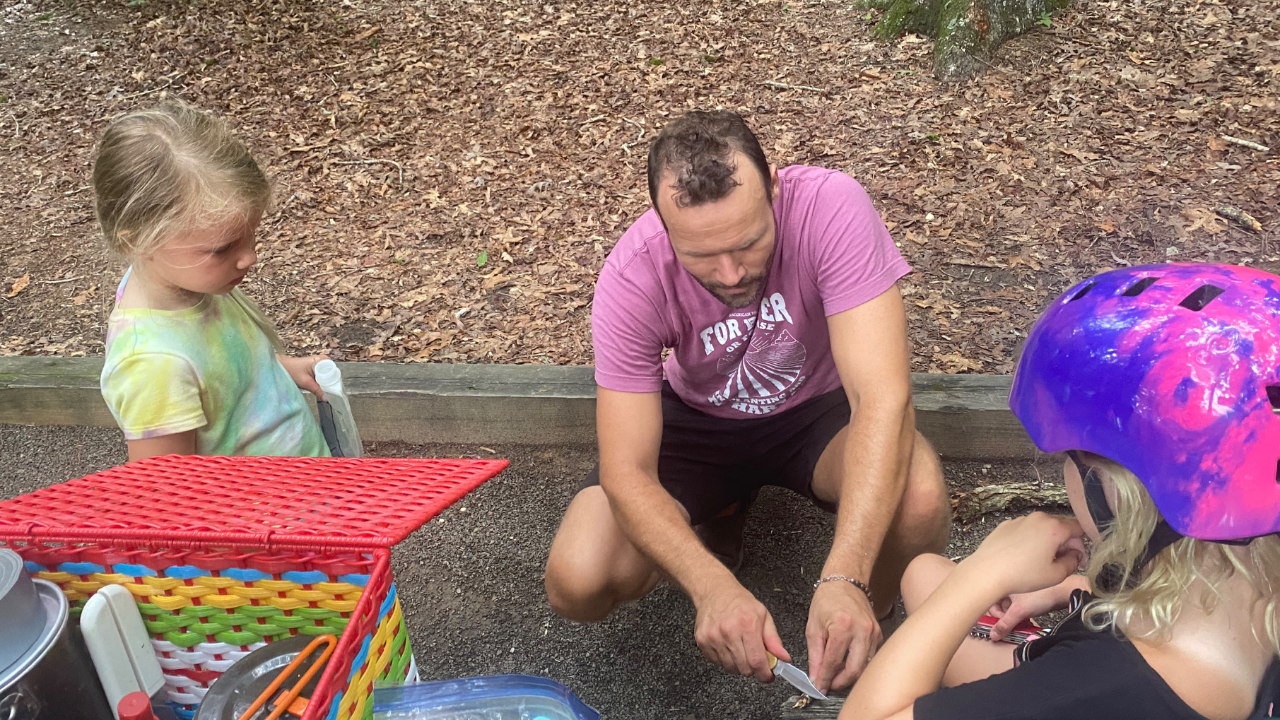
Camping, Pocket Knives, and Sex Education: Why Guiding Your Child Matters
Jan 27, 2025This summer, we took the plunge—camping with our kids. It was the perfect time, with our 8- and 6-year-olds finally ready to enjoy the outdoors. And it turned out to be one of those magical experiences where everything just clicked. The kids were riding bikes, playing, and having the time of their lives.
One moment stood out: while digging through our camping gear, they found my husband Joel’s pocket knife collection. “What are these?” they asked. Instead of brushing them off, Joel took the time to sit down and teach them how to safely use the knives—how to open them, hold them properly, and even whittle a stick. It wasn’t just a lesson about knives; it was about teaching respect, safety, and responsibility.
That got me thinking—why don’t we approach talking to our kids about sex with the same thoughtfulness?
Why Sex Education Needs More than a “One-Time Talk”
Think about how Joel taught the kids about knives. He didn’t just hand them a knife and say, “Be careful!” He explained how to use it properly, how to be safe, and when to set boundaries. Similarly, sex education shouldn’t just be a “one-time talk” or a hand-off of a book. It needs to be ongoing, thoughtful conversations that cover the facts and the values that guide them.
Far too many parents either avoid the conversation or offer vague advice, hoping their kids will “figure it out” on their own. But here’s the thing: kids need more than that. They need us to guide them through the complexities of growing up, so they can make informed, healthy decisions.
The Best Time to Start? As Early as Possible
Just like teaching kids to safely use a pocket knife, sex education should start early. And no, I’m not talking about talking about sex at age 3, but introducing the concepts of body parts, privacy, and respect for others’ bodies can start young.
Here’s a quick breakdown of when to introduce key topics:
- Ages 3-5: Body awareness, naming body parts, and understanding the concept of personal space.
- Ages 6-9: Puberty basics, privacy, boundaries, and understanding relationships (friendships and family).
- Ages 10-13: More detailed puberty changes, sexual attraction, and emotional development.
- Ages 14+: Healthy relationships, consent, safe sex practices, and managing peer pressure.
How to Talk to a Kid About Sex and Puberty: Simple, Effective Strategies
You might be wondering: “How do I even start these conversations?” Here’s the secret—it doesn’t have to be awkward. In fact, with the right tools, it can be natural, empowering, and part of your daily life.
-
Start Early & Keep It Simple: When your kids are young, explain body parts with the correct terminology (no euphemisms). Use simple, honest language and make sure they understand consent and body autonomy.
-
Encourage Questions: Invite your child to ask anything they’re curious about. Answer their questions as honestly as possible, keeping the conversation age-appropriate.
-
Keep It Ongoing: These aren’t “one-time talks.” Start with small conversations and build on them. Use everyday moments—like watching TV or reading a book together—as opportunities to talk about relationships, respect, and boundaries.
-
Be a Safe Place for Tough Topics: Let your child know they can come to you with questions about sex, puberty, or anything else. Don’t shut down the conversation, even if it feels uncomfortable.
Why My Clarify Lesson Series Is the Best Homeschool Sex Ed Curriculum for Parents
Talking to your kids about sex, puberty, and relationships can feel daunting. That’s why I created the Clarify Lesson Series—to help you start these conversations with confidence.
The series includes short, 10-minute sex ed videos for kids that cover topics like puberty, body changes, sexual attraction, healthy relationships, and online safety. I use both scientific terms and everyday language, so your child fully understands what to expect as they grow.
But it’s not just about the videos. I’ve also created guidebooks for parents filled with discussion prompts, reflection activities, and tips on how to talk about these sensitive topics in a way that aligns with your family’s values.
With Clarify, you can:
- Start important conversations without the awkwardness.
- Provide your child with the facts they need.
- Help your family talk about sexuality in a way that’s respectful, informed, and empowering.
Don’t Wait—Start the Conversation Today
Are you ready to be your child’s go-to source for sex education? With the Clarify Starter Bundle, you can begin these vital conversations today. Get access to age-appropriate content and expert guidance that helps create a safe space for your child to grow up informed, confident, and ready to navigate the world around them.
Get started today and make sex education a natural, ongoing part of your parenting journey.
Great relationships start with good communication.
Having open, honest conversations with your child is key to preparing for "The Talk." I’ve got a FREE offer to help make those conversations even more impactful.
Click below to get your Clarify Starter Bundle—including the "Preparing for The Talk" Video & Digital Guide—for FREE!
